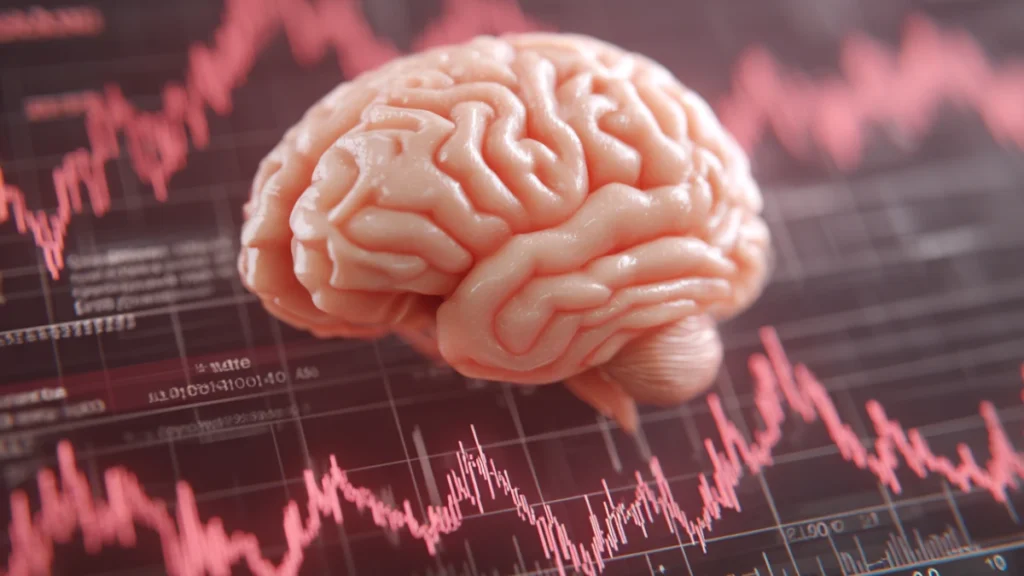Table of Contents
Introduction
Most traders obsess over charts, indicators, and strategies — but ignore one of the biggest market movers of all:
Their gut.
Science now confirms that your gut and brain are in constant communication.
And this link — known as the gut-brain axis — plays a huge role in your focus, emotional regulation, mental clarity, and even your trading confidence.
If you’ve ever:
• Felt foggy or impulsive after a heavy meal
• Noticed anxiety spike after coffee or sugar
• Struggled to concentrate during certain hours
…it’s not a mindset problem.
It’s a biochemical imbalance — one that starts in your digestive system.
This article breaks down the cutting-edge research behind the gut-brain connection and shows you how to optimize your nutrition for peak trading performance.
What Is the Gut-Brain Axis? (And Why Traders Should Care)
The gut-brain axis refers to the bi-directional communication system between your gastrointestinal tract and your central nervous system — especially the brain.
This connection isn’t just metaphorical.
Your gut contains a vast network of neurons (called the enteric nervous system) and produces over 90% of the body’s serotonin, the same chemical that regulates:
• Mood
• Focus
• Sleep
• Impulse control
• Emotional resilience
This means your trading psychology doesn’t just live in your head — it’s influenced by what’s happening in your digestive tract.
🧬 Key Scientific Insights:
• The vagus nerve is the main highway between your gut and brain — sending constant signals that affect how you feel and act.
• A healthy gut microbiome improves cognitive flexibility, attention, and decision-making.
• Imbalances in gut bacteria are linked to anxiety, depression, and impaired risk evaluation.
As a trader, this means your slumps, streaks, and self-control issues may have more to do with inflammation, blood sugar, or gut imbalance than mindset alone.
How Gut Health Affects Trader Performance (Focus, Mood, Impulse Control)
You might think your trade decisions come from your prefrontal cortex — but your gut microbiome plays a surprisingly large role in shaping the quality of those decisions.
Here’s how a healthy or unhealthy gut directly affects your trading performance:
- Cognitive Clarity and Focus
A balanced gut microbiome promotes the production of acetylcholine and brain-derived neurotrophic factor (BDNF) — both crucial for learning, focus, and neural efficiency.
🧠 Poor gut health? Expect more:
• Mental fog
• Shortened attention span
• Missed setups from zoning out
- Mood and Emotional Stability
Over 90% of serotonin is produced in the gut.
Low levels lead to:
• Anxiety spikes before trades
• Emotional swings after wins/losses
• Self-sabotaging behavior when under pressure
Gut inflammation also raises cortisol (the stress hormone), making it harder to stay calm in volatile markets.
- Impulse Control and Overtrading
Your gut influences dopamine regulation, the neurotransmitter that governs reward-seeking behavior.
Imbalances lead to:
• Cravings for action
• Chasing trades
• Revenge entries after losses
When your gut is inflamed or imbalanced, the brain becomes more reactive — increasing risk-taking and emotional decisions.
🧠 In short: if you can’t sit still, wait patiently, or stay emotionally grounded — your gut may be misfiring, not just your discipline.

The Worst Foods for Trader Brain Function (And What to Eat Instead)
Your gut is home to trillions of microbes that influence your mood, focus, and energy.
What you eat determines whether those microbes help or hurt your trading edge.
Let’s break it down.
🚫 Worst Offenders for Gut-Brain Balance:
- Refined Sugar
Spikes blood glucose → crashes focus → increases anxiety.
Also feeds harmful gut bacteria linked to brain fog and poor memory. - Seed Oils (like soybean, corn, canola)
High in omega-6 fatty acids, which trigger inflammation in the brain and gut.
Inflammation = slower reaction time and emotional volatility. - Artificial Sweeteners (Aspartame, Sucralose)
These disrupt the gut microbiome and are linked to decreased dopamine sensitivity.
Translation: you feel less reward and chase more action. - Highly Processed Foods (Fast food, frozen meals)
Loaded with preservatives, chemicals, and emulsifiers that disrupt gut lining and neurotransmitter balance. - Too Much Caffeine
Increases cortisol and can irritate the gut lining, leading to nervous energy and poor sleep — both enemies of smart decision-making.
✅ Trader-Friendly Foods for Gut & Brain Support:
- Fermented Foods
Yogurt (with live cultures), kefir, kimchi, sauerkraut — all support healthy bacteria that regulate mood and digestion. - Leafy Greens & Fiber-Rich Veggies
Feed beneficial gut bacteria and reduce inflammation. - Wild-Caught Fatty Fish
Rich in omega-3s that reduce brain inflammation and support emotional regulation. - Berries & Dark Chocolate (in moderation)
High in antioxidants and polyphenols that boost BDNF and improve cognitive performance. - Green Tea or Matcha
Gives alertness without the cortisol spike of coffee — plus gut-friendly catechins.
What you feed your gut is what you feed your focus.
Good inputs = better decisions, better trades, better results.
Simple Nutrition Tweaks for Better Trading Days
You don’t need a perfect diet to improve your trading — you just need a few targeted adjustments that support gut health, brain chemistry, and energy stability.
Here are practical, science-backed tweaks you can apply right away:
- Start the Day with a Gut-Soothing Breakfast
Instead of sugary cereals or heavy carbs, opt for:
• Greek yogurt + berries + chia seeds
• Eggs with spinach and olive oil
• Oats with a spoon of kefir or probiotic yogurt
This stabilizes blood sugar and boosts serotonin precursors for calmer, more focused mornings.
- Time Your Caffeine
• Avoid coffee on an empty stomach (triggers gut irritation + cortisol spikes).
• Wait 60–90 minutes after waking.
• Try green tea for gentler energy with L-theanine for focus.
- Hydrate Before You Trade
Even mild dehydration reduces cognitive performance and increases brain fog.
→ 1–2 glasses of water with electrolytes or lemon first thing in the morning.
- Snack Smart During Trading Hours
Replace mindless snacking with foods that support neurotransmitters:
• Almonds or walnuts (brain fats)
• Dark chocolate (dopamine boost)
• A banana + peanut butter (sustained glucose + mood)
- Post-Session Gut Recovery
After a stressful session, calm your system with:
• Chamomile or peppermint tea
• A light protein + veggie meal
• Fermented foods (sauerkraut, kimchi, yogurt) to rebalance gut flora
Consistency in diet builds consistency in brain chemistry — which leads to consistency in execution.
Supplements That Support Gut-Brain Function (Science-Backed)
While whole foods are the foundation, certain evidence-based supplements can help optimize your gut-brain axis — especially for traders under high stress or mental demand.
Here are top choices backed by neuroscience and clinical research:
- Probiotics
These restore healthy gut flora, which improves:
• Serotonin production (mood stability)
• Dopamine signaling (focus and motivation)
• Reduced inflammation
🧪 Best strains for mood and cognition:
Lactobacillus rhamnosus, Bifidobacterium longum, Lactobacillus plantarum
🕒 Take daily with food for best results.
- Omega-3 Fatty Acids (DHA & EPA)
Crucial for brain structure, neurotransmitter flow, and anti-inflammatory effects.
✅ Improves:
• Focus under pressure
• Emotional regulation
• Reaction time during volatile trades
🎯 Ideal dose: 1000–2000 mg combined EPA/DHA per day.
- L-Glutamine
An amino acid that supports the integrity of the gut lining and reduces “leaky gut” symptoms.
✅ Benefits:
• Better digestion = clearer mental state
• Lower cortisol = calmer trading mindset
Often used by athletes and high performers during stressful periods.
- Magnesium Glycinate
Supports the nervous system and regulates stress response.
✅ Helps:
• Calm the mind
• Improve sleep
• Reduce impulsive behavior during trading
🕒 Take before bed or after stressful sessions.
- Adaptogens (Ashwagandha, Rhodiola)
Plant-based compounds that reduce stress and balance hormones linked to gut health (like cortisol and adrenaline).
✅ Especially useful for:
• Burnout prevention
• Staying composed through drawdowns
• Reducing emotional reactivity
⚠️ Always consult your doctor before starting supplements — especially if you’re on medication or have underlying conditions.

Final Thoughts: Your Gut Is the Missing Edge
In the world of trading, we’re taught to optimize everything — charts, risk, setups, systems.
But the most overlooked edge lives inside your own body.
The gut-brain axis isn’t just a health topic — it’s a performance tool.
When your gut is inflamed, your brain is clouded.
When your gut is balanced, your mind becomes calm, clear, and precise — exactly what trading demands.
Think about it:
• The moment you feel anxious before pressing “Buy”…
• The hesitation to take profit because of fear of missing out…
• The self-sabotage that kicks in after a red day…
These aren’t just mental lapses.
They’re biological responses — triggered by imbalances you can influence through nutrition, hydration, sleep, and recovery.
You’re not just feeding your body — you’re feeding your decisions.
Here’s the takeaway:
📈 Great trades are built on great decisions.
Great decisions are built on a stable, resilient nervous system — and that begins in the gut.
If you’re serious about mastering your mindset and unlocking consistency, don’t just study charts — study yourself.
Your microbiome might be the hidden variable that takes you from emotional to elite.
If you’ve ever found yourself wondering why some trading days feel sharp, focused, and calm — while others spiral into emotional chaos despite having the same strategy — the answer might not be in your charts, but in your biology. Your digestive system plays a far more powerful role in mental performance than most traders realize. When your internal environment is balanced and supported by quality nutrition, you’re far more likely to experience sustained focus, emotional control, and the clarity needed to execute trades without hesitation.
But when inflammation is present, or blood sugar crashes from poor food choices, your brain’s decision-making centers become fogged, reactive, and reward-seeking — leading to overtrading, hesitation, and fear-based exits. This connection has been extensively explored in neuroscience and nutrition, and it’s why elite performers across industries have turned to gut-friendly protocols to stay mentally sharp. If you want to go deeper into the mechanics of improving trade psychology through structure and consistency, start with our guide on moving averages in trading
it’s a great entry point into blending biology and strategy. And for a clinical breakdown of how the digestive tract affects mood, cognition, and decision-making, this article from Healthline offers a science-backed explanation of the gut-brain relationship and how small nutritional shifts can create massive mindset improvements. Ultimately, the edge you’re looking for may not lie in a new system, but in your daily meals, hydration, and recovery habits. By treating your body like a performance machine — not just a vessel — you create a mental environment where precision, patience, and discipline become second nature.

